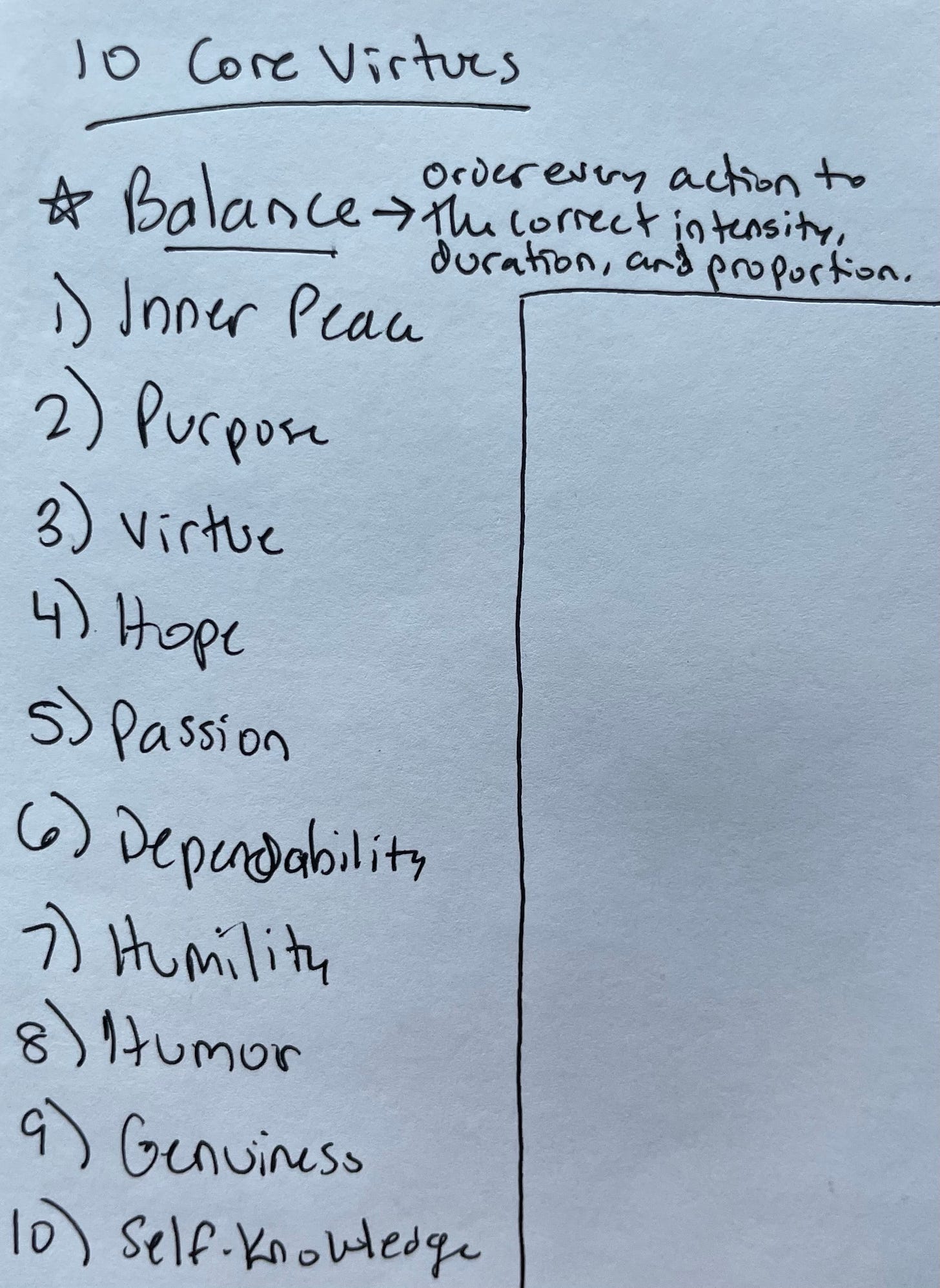Ben Franklin’s Practice of the Moral Virtues
Ben Franklin crossed off humility from his list. It was the 13th virtue he studied and practiced—1 per week—on a revolving basis for the 52 weeks of the year.
Ben Franklin, like many other great men in history—knew the importance of dedicating time to practice the moral virtues.1
Ben Franklin’s Chart
The key to Ben Franklin’s practice of the virtues is that he picked one each week, and practiced it diligently.
He picked one at a time, and asked himself: Did I violate the virtue of humility this week? If he did, he added a dot on the chart. By the end of the 13 weeks, a clean chart meant that he had achieved “moral perfection”.
Mastery Through Repetition
One important key to his practice is the repeating nature of the virtue practice. With 52 weeks in the year, that gave him the opportunity to practice, and re-practice each of the 13 virtues 4 times throughout the year.
But why re-practice each virtue multiple times throughout the year, rather than learning new ones?
Human Nature
It’s in our nature as humans to need to be reminded of what we ought to do, than to need to be taught something new.2
Think about it. Since you were a baby, you were probably encouraged to practice basic virtues.
“Sharing is caring.”
“Treat others how you want to be treated.”
“No hitting!”
The lessons for moral virtues aren’t new—we just often forget them and have to re-commit to practicing them.
What This Meant To Ben
In his autobiography, Franklin outlined a "bold and arduous project of arriving at moral perfection" through practicing 13 virtues, emphasizing self-improvement and a virtuous life.3
He saw attainment, or at least the pursuit of attainment of the moral virtues as a key ingredient of self-improvement.
What This Means To Us
What moral virtues are you deficient in?
Do you lack charity with your roommates?
Do you struggle to be patient with your family?
Do you need to be more industrious at work?
Whatever the virtue, moral growth is often the highest investment in self-improvement that you can make. The answer to many of our challenges in life is to become more virtuous.
My Core Virtues
I too, keep a practice of systematically developing my virtues. But like Franklin, I recognize that I often need to be reminded of my virtues, than taught new ones.

Every once in a while, I will open to the front page of my journal to identify which virtues I’m most deficient in.
The Virtue of Balance
Currently, it’s balance—defined as “the ability to order every action to the correct intensity, duration, and proportion”.
Part of achieving balance, is spending only 30 minutes per day writing, so that I can give the appropriate time to my family and work in sales. My alarm for 30 minutes is up. So I’ll leave you with one question to think about.
What virtue do you need to develop today?
—Grant Varner
In the autobiography of Ben Franklin, his moral virtues were as follows:
Temperance—eat not to dullness; drink not to elevation.
Silence—speak not but what may benefit others or yourself; avoid trifling conversation.
Order—let all your things have their place; let each part of your business have its time.
Resolution—let all your things have their places; let each part of your business have its time.
Frugality—make no expense but to do good to others or yourself; i.e. waste nothing.
Industry—waste no time; be always employed in something useful; cut out all unnecessary actions from your life.
Sincerity— use no hurtful words; think justly, and, if you speak, speak truthfully.
Justice—wrong no one by doing injuries to others; nor neglect your duties.
Moderation—avoid extremes; forbear resenting injuries so much as you think they deserve
Cleanliness—tolerate no uncleanliness in body, clothes, or habit.
Tranquility—don’t let your mind get affected by the daily stresses of life.
Chastity—use sexuality to its correct end.
Humility— imitate Jesus and Socrates.
The saying "Men more frequently require to be reminded than informed" is attributed to the British author and lexicographer, Samuel Johnson, implying that people often need reminders of what they already know rather than new information.
Franklin, Benjamin. The Autobiography of Benjamin Franklin. Dover Publications, 1996.




